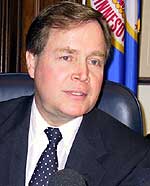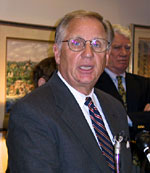By Elizabeth Stawicki
Minnesota Public Radio
May 16, 2002
Attorney General Mike Hatch says Minnesota Partnership for Action Against Tobacco, created with proceeds from the state's tobacco trial settlement, has squandered the public's trust and failed to help smokers quit. Critics say Hatch's court fight to dismantle the group shouldn't be a surprise, he hasn't maintained the distance from tobacco lobbyists that his predecessor did.
| |
|
|
|
||
Minnesota Attorney General Mike Hatch filed suit about a month ago to divide MPAAT's endowment between the University of Minnesota and the state Health Department. He's argued that MPAAT has focused too much on funding local campaigns to ban smoking in public and had forgotten to help those who were victimized and defrauded by tobacco -the smokers.
"Their own consultants said, 'help the smoker's quit.' ...That's what they were supposed to do, but they haven't done it," says Hatch.
Hatch has argued that the MPAAT board lacks accountability. He says it's rife with conflicts of interest because 80 percent of the endowment's grants go to the organizations of MPAAT's board of directors.
Hatch is not alone in his concern. Former state Supreme Court Justice Sandra Gardebring resigned from the board, saying she was troubled over the pattern of conflicts. Hatch says the board repeatedly ignored his and other non-profit groups' recommendations for avoiding conflicts. So after three years of intense conversations, he said he had no alternative but to take the case to court.
|
"I think they're outright conflict of interests. And I think Mike Hatch needs to recuse himself from the debate he alone created."
- Thomas Kottke |
"Whose money is this? The courts make it clear and the statutes make it clear. I just can't go and have a settlement and give money to my friends. It is a fund, a tobacco cessation fund and a research fund. MPAAT was appointed to administer them. They have failed their duty. We are now seeking another administrator to do it," Hatch said.
The chairman of MPAAT's board, Dr. Richard Hurt, says Hatch is wrong in accusing MPAAT of failing to help smokers. Hurt heads Mayo Clinic's Nicotine Dependence Research Center and was the state's core witness in its lawsuit against the tobacco industry. He says Hatch's charge ignores the facts.
"We have a telephone quit line which is state of the art, which has a long reach out into the community. We have initiatives underway to help health systems so they can better provide services within their own health systems; we're helping to change the environmental norms so that smoking is no longer the accepted norm and we know that helps people to try to stop," Hurt says.
MPAAT's creator and Hatch's predecessor, Skip Humphrey, disputes Hatch's accusations that the organization lacks proper oversight. He says full accountability and open monitoring was central to MPAAT's design.
"That's why you have representatives appointed by the attorney general. That's why you have legislators on the board. That's why you have a requirement that every biennial year, they report to the Legislature, they report to the court, and that the legislative auditor audits them," according to Humphrey.
| |
|
|
|
||
Both Skip Humphrey and Mike Hatch are longtime, dyed-in-the-wool DFLers with generally similar political philosophies. But they haven't shared the same arms-length relationship with the tobacco industry when it comes to campaign contributions.
When Humphrey ran for governor right after the state's landmark tobacco trial, he vowed he wouldn't accept cash or fundraising help from anyone associated with the tobacco industry. Campaign Finance Board records show Hatch's campaign reimbursed one of the state's most influential lobbyists, Ron Jerich, on three occassions for fundraising.
Fundraisers can steer far more money into campaign coffers than single contributions, which are capped in Minnesota. Both Jerich and his wife are registered lobbyists for R. J. Reynolds.
"I think they're outright conflict of interests. And I think Mike Hatch needs to recuse himself from the debate he alone created," says Rochester cardiologist Thomas Kottke, who helped form MPAAT, but is not a board member.
"It's like when we see a patient with cancer and we look in their blood and see one blast cell; it means they have leukemia. We see one donation, we see one political favor and it's a sign there's probably a lot more that we haven't been able to detect," says Kottke.
Hatch says his criticism of MPAAT has nothing to do with campaign contributions. "Because Ron Jerich, who happens to represent some gasohol people, the corn growers and Xcel Energy and apparently also represents a tobacco company, although I can swear on a stack of Bibles that he's never talked to me about tobacco. To say that somehow impugns the process is ridiculous; this is McCarthyesque at its worst," Hatch says.
David Schultz, a professor of public administration at Hamline University, says the public should question Hatch's ties to tobacco. The former lobbyist for the public watchdog group Common Cause says while Jerich lobbies for several organizations, he's closely identified with the tobacco industry and supporting its interests.
"One can't separate him off and say that's not an important issue. But one also has to look at the other individuals who are associating with Mike Hatch, who also have tobacco industry ties. And when you look at all those pieces together, that gives one a reason to ask some questions about what influence the tobacco industry has upon what he's doing," says Schultz.
Those associates include Tom Kelm, who for many years was the Minnesota point person for the tobacco industry's lobbying arm, the Tobacco Institute. The institute was a defendant in Minnesota's landmark trial. Kelm also headed North State Advisors, a lobbying group that represented tobacco clients.
Hatch wants to disband MPAAT and replace it with a five-member board including former Gov. Arne Carlson. Carlson has his own tobacco connections. Documents released at the state's tobacco trial showed Philip Morris helped pay for Carlson's trip to Australia in 1996. Records also show Carlson's son has been a lobbyist for Lorillard Tobacco. And both Ron Jerich and Tom Kelm held fundraisers for Carlson's last election campaign.
"He was a governor of this state. And if I have to trust someone in terms of integrity and building public confidence, I'll take Arne Carlson before I take anyone on that MPAAT board," Hatch said.
More from MPR

